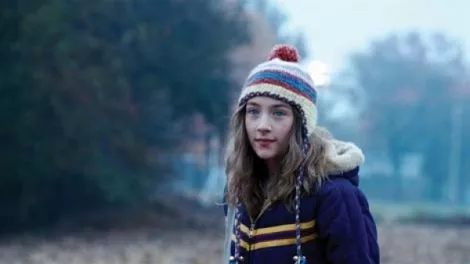
Yes, of course: A book is a book, and a movie is a movie, and only in some mutant form shall the twain meet. A filmmaker adapting a literary work—especially a well-known or much-loved literary work—faces a daunting task in satisfying fans of the source material, despite the fundamentally different demands of the two media. “It wasn’t as good as the book” often becomes a clumsy way of saying, “I like my eggs over easy, and you gave ’em to me scrambled.”
On paper, it probably seemed to Peter Jackson that he had a take on Alice Sebold’s The Lovely Bones that was inherently more cinematic—more “movie-ish”—than the story Sebold told. But the problem isn’t necessarily that Jackson attempted something radically different than what appears in the book. The problem is that he didn’t succeed.
Plenty of the most fundamental plot elements are the same, of course. We learn early on through the voice-over narration by 14-year-old Susie Salmon (Saorise Ronan) that she was murdered in December 1973, and is telling her tale from beyond the grave. The perpetrator was a neighbor named George Harvey (Stanley Tucci), who is able to go on about his life while Susie’s parents (Mark Wahlberg and Rachel Weisz)—who know only that she has disappeared, no body or suspect having turned up—fail miserably at overcoming their grief. Susie, meanwhile, watches from a limbo-like afterlife, pondering the life she never got to live and worrying over the family members left behind.
Susie’s unresolved post-mortem existence served as the metaphorical heart of Sebold’s novel, which concerned itself not just with the tragedy of Susie’s murder but the compounded tragedy of a family torn apart by a lack of closure. Jackson literalizes Susie’s world as a shifting, luminous dreamscape, similar to the one he created 15 years ago for Heavenly Creatures. And it often seems a bit too reminiscent of the cotton-candy heaven from the saccharine 1997 Robin Williams drama What Dreams May Come.
At least in those scenes, though, Jackson is sticking to his source. His downfall really comes when it becomes clear that he sees The Lovely Bones as a gritty thriller. As Susie’s father becomes obsessed with resolving the case, Jackson starts to spend huge chunks of screen time on George. We see him attending to the creepy dollhouses that are his hobby; we see him hiding a key piece of evidence during a police interview; we see him planning what may be his next crime. The growing suspicions of Susie’s younger sister, Lindsey (Rose McIver), and some tense set-pieces of her exploring George’s house are drawn straight from the book, but Jackson pulls that subplot into a bigger picture—including an embarrassingly misguided final scene for George—that makes The Lovely Bones feel like capturing the killer is the entire point of the story.
It’s hard to imagine that approach making the film anything but a conventional serial-killer thriller under the best circumstances, but it’s undermined completely by Tucci’s performance. Ordinarily a reliably understated actor, Tucci here turns into an absurd caricature of the Creepy Guy Down the Street. He prowls around his darkened house with his greasy comb-over, sits in his basement staring at a suspicious safe, and generally does everything but wear a flashing red “PSYCHO!” sign. Inexplicably, Tucci is being touted as an Oscar candidate—which would put him in good company with Mystic River’s Oscar-winning Tim Robbins in the category of “Least Subtle Representation of Emotional Instability Ever.”
The shame of it is that, at least early on, it seems possible that both Tucci’s performance and Jackson’s approach could work. The scene between Tucci and Ronan in George’s underground “playhouse” builds a sinister tension, as we become aware along with Susie of the deep trouble she’s in. And Ronan is impressive throughout, particularly as the still-living Susie experiencing the first twinges of a grown-up emotional life. Once Susie dies, however, The Lovely Bones no longer seems interested in how its non-insane characters think and feel.
Jackson was under no obligation to produce a duplicate of Sebold’s book. But it would have been nice to see him at least produce something real.
THE LOVELY BONES
![]()
Saoirse Ronan, Mark Wahlberg, Stanley Tucci
Rated PG-13
